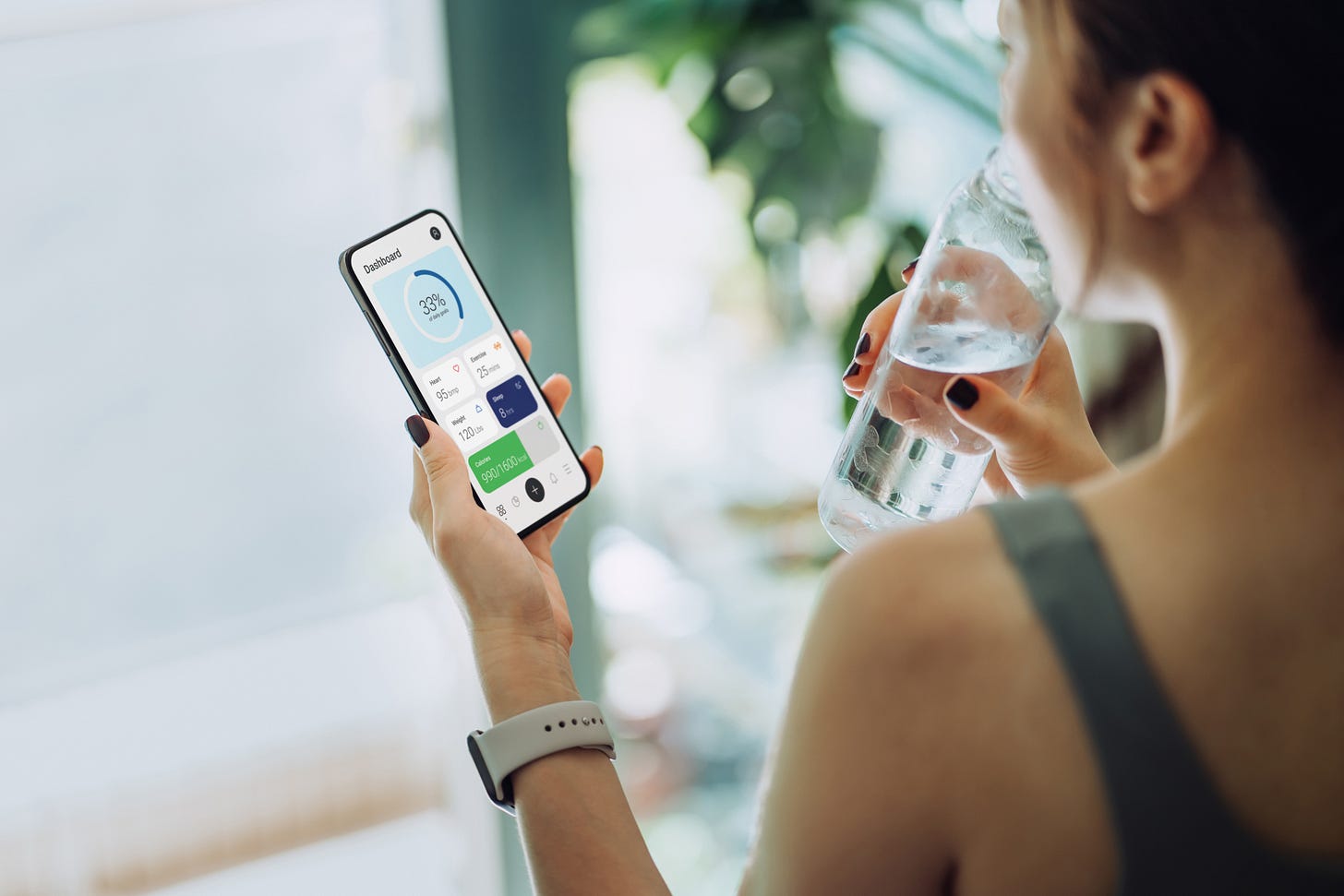The Tyranny of the Tracker: When Numbers Take Over Our Lives
Data can guide us but the moments that matter most aren’t measured; they’re lived.
I recently watched a friend check her phone during what should have been a blissful sunset walk. She wasn’t scrolling Instagram or answering texts, she was making sure her steps were “counting.” Because apparently, if your fitness tracker doesn’t witness your exercise, did it even happen? It’s like the philosophical question “If a tree falls in a forest and no one’s around to hear it,” except now it’s “If you take 10,000 steps but your Fitbit is dead, did you actually walk?”
We’ve become a society of compulsive counters, turning life into one giant spreadsheet. Sleep quality: tracked. Water intake: logged. Mood: rated on a scale of 1-10. Productivity: measured in Pomodoro tomatoes. We quantify our friendships through text response times, our worth through LinkedIn connections, and our happiness through meditation streak counters.
The irony is delicious: in our quest to optimize everything, we’ve optimized the joy right out of living.
The Seductive Promise of Numbers
There’s something undeniably appealing about measurement. Numbers feel objective, scientific, true. They promise control in an uncontrollable world. Your boss might be unpredictable, your relationship might be complicated, but at least you can know with mathematical certainty that you drank 64 ounces of water today.
But here’s the catch: when everything becomes a metric, nothing feels meaningful. That gorgeous sunset my friend almost missed? It doesn’t show up in any app. The spontaneous conversation with a stranger that shifts your perspective? Zero trackable data points. The moment of pure contentment while doing absolutely nothing productive? Your productivity app would file it under “wasted time.”
We’re measuring ourselves into a corner, mistaking the map for the territory, the numbers for the experience itself.
The Dark Side of Data
Research shows that excessive self-monitoring can actually backfire. When we constantly track our mood, we become more neurotic about our emotional states. When we obsess over step counts, we start to feel guilty about rest days. When we measure our meditation practice, we turn inner peace into a performance metric.
It’s like having a particularly annoying life coach living in your pocket, one who never takes a day off and always wants to know: “But did you optimize that experience? Did you track it? Did you beat yesterday’s numbers?”
The psychological term for this is “measurement reactivity,” the phenomenon where the act of measuring something changes the thing being measured. Your heart rate goes up when you’re constantly checking your heart rate monitor. Your stress increases when you’re tracking your stress levels. Your spontaneity dies when you’re logging every spontaneous moment.
Finding the Sweet Spot
So should we throw our fitness trackers in a drawer and embrace complete numerical nihilism? Not necessarily. The goal isn’t to eliminate all measurement but to be intentional about it. Think of tracking tools like salt: a little can enhance the flavor of life, but too much ruins the whole dish.
Here’s a four-part framework for healthy measurement:
1. Track with purpose, not compulsion
Ask: Why am I measuring this? If the only answer is “the app told me to” or “everyone else is,” that’s a red flag. Good reasons might include managing a health condition, training for a specific goal, or gaining insight into patterns you genuinely want to understand.
2. Choose your metrics wisely
You can’t optimize everything, so pick what matters most. Maybe that’s sleep quality because you’ve been feeling tired, or maybe it’s spending time with friends because you’ve been too isolated. But not both, and definitely not those plus twelve other things.
3. Schedule measurement-free zones
Designate times and spaces where numbers don’t matter. Maybe meals become about taste and connection, not macros. Maybe walks become about noticing the world, not hitting step goals. Maybe conversations happen without checking your phone for response time optimization.
4. Practice productive procrastination
Sometimes the most productive thing you can do is to be completely unproductive. Lie in a hammock. Stare at clouds. Have a meandering conversation that goes nowhere. These moments don’t generate data, but they generate something more valuable: perspective.
The Unmeasured Life
The ancient Greeks had a concept called kairos: time that’s qualitative rather than quantitative, moments that matter not because of their duration but because of their depth. It’s the opposite of our modern obsession with chronos, the tick-tock marching of measured time.
Your phone can tell you exactly how many minutes you spent with your child today, but it can’t measure the quality of attention you gave them. It can track how many words you wrote, but not whether those words moved someone. It can count your steps, but not the wonder you felt watching a butterfly land on your path.
Perhaps the healthiest relationship with measurement is to use numbers as tools, not masters. Let them inform your decisions, not control your experience. Track what serves you, ignore what enslaves you, and remember that the most important things in life—love, meaning, beauty, connection—have always been unmeasurable.
After all, if you’re constantly looking down at your tracker, you’re going to miss the very life you’re trying to optimize.
So here’s a radical idea: for the next hour, don’t count anything. Don’t track, measure, log, or quantify. Just be. Your spreadsheet can wait. Your life can’t.



This is fantastic. Thank you for sharing this meaningful perspective.
If only people tracked their spending and saving instead of everything else.